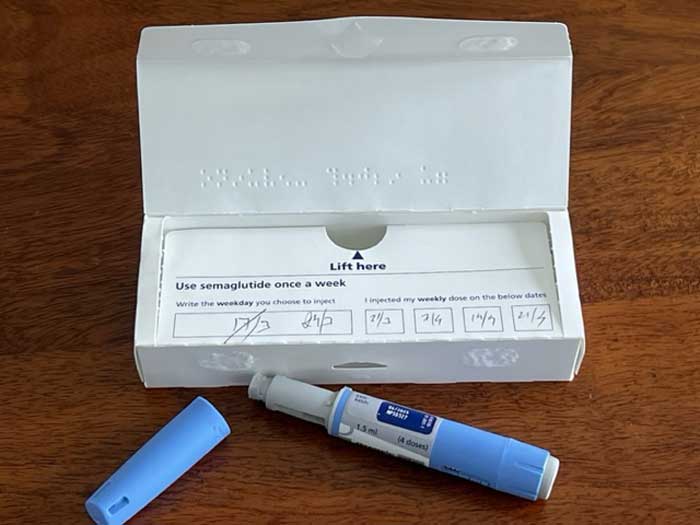
Ozempic (semaglutide) has been generating a lot of buzz recently as a diabetes and weight loss treatment. The drug, which combines an analogue of a human hormone with an insulin, helps control blood sugar levels and can cause significant weight loss. Ozempic received approval from the UK’s Medicines and Healthcare products Regulatory Agency (MHRA) in 2017 as an injectable treatment for type 2 diabetes.
However, as with any drug, there are safety and side effect concerns that users should be aware of before starting Ozempic. While the drug has been shown to be effective at controlling blood sugar and aiding weight loss, users need to understand that it comes with risks and is not a quick fix or magic pill. Taking a safe and measured approach to Ozempic is important.
At the start of 2023 the media were hyping up Ozempic as a miracle weight loss drug. It is on,ly now that some of the negatives are coming to light. The possible side effects caused by Ozempic are a major cause for concern. The high cost of Ozempic in the UK is also putting potential user off the jab.
Ozempic Vs Natural Weight Loss Pills
Content
Here are some of the main pros and cons of Ozempic versus natural weight loss pills:
Ozempic Pros:
- Much higher weight loss potential. Studies show Ozempic leads to an average of 8-12% of body weight loss, while most natural weight loss pills result in only 1-3% weight loss.
- More effective appetite suppression. Ozempic works by mimicking a hormone that naturally curbs appetite, so people tend to eat less and feel fuller faster.
- Improves blood sugar levels. For people with diabetes, Ozempic can significantly lower HbA1c and blood sugar.
Ozempic Cons:
- Requires prescription and medical supervision. Natural pills are over-the-counter.
- More expensive. Ozempic costs £80-200 per month, while natural pills usually cost £10-50 per month.
- More side effects. Nausea, vomiting and diarrhea are common with Ozempic, though they tend to diminish over time.
Natural Weight Loss Pills Pros:
- Easily accessible. Available over the counter without a prescription.
- Inexpensive. Cost a fraction of what prescription medications cost.
- Fewer side effects generally. Since they use plant-based ingredients, side effects tend to be mild.
Natural Weight Loss Pills Cons:
- Slightly lower weight loss results on average. Most people only lose 1-3% of body weight using natural pills.
- Many natural weight loss supplements have not been as thoroughly studied – with the exception of PhenQ natural fat burner and a handful of other OTC diet pills.
- Potential interactions. Some natural ingredients can interact with other medications a person is taking.
While Ozempic tends to deliver significantly better weight loss results along with blood sugar benefits, it also comes with more potential side effects, costs more money and requires a prescription. Natural weight loss pills are generally safer, cheaper and easier to access but provide only modest weight loss potential at best for most people. Consumers need to weigh the pros and cons based on their individual needs, health status and goals.
Famous Celebrities Who Have Lost Weight on Ozempic
A few notable UK celebrities have (allegedly) lost significant weight while taking Ozempic (semaglutide), including:
- James Corden – The talk show host and comedian revealed in May 2022 that he had lost over 35 kg (80 lbs) in weight thanks to Ozempic. He said the injection has been “life-changing” for him and he feels much healthier.
- Dawn French – The comedian and actress reportedly lost around 19 kg (42 lbs) in 2021 after starting Ozempic. She said the medication helped curb her appetite and snacking impulses.
- Gemma Collins – The TOWIE star credited Ozempic for helping her lose around 3.5 stone (over 20 kg/45 lbs) in 2021. She said the injectable treatment made losing weight “effortless” and “not something [she] had to think about.”
- Vicky Pattison – The former Geordie Shore star said Ozempic, combined with exercise and a healthy diet, helped her shed over 16 kg (35 lbs) in 2021. She found that the medication curbed her sugar and carb cravings.
- Beverley Callard – The Coronation Street actress revealed she had shed 4 stone (over 25 kg/55 lbs) thanks to following a diet plan and using Ozempic. She said the injections “absolutely changed her life” by controlling her appetite.
So as you can see, a number of well-known UK celebrities have spoken publicly about how Ozempic helped them achieve significant weight loss. However, the medication should only be used under medical supervision as part of a comprehensive weight management plan.
What Does Ozempic Actually Do?
Ozempic (semaglutide) was originally created as a treatment for type 2 diabetes. It is part of a class of drugs known as GLP-1 receptor agonists, which work by mimicking a hormone that helps regulate blood sugar levels.
Specifically, Ozempic is a once-weekly injectable form of semaglutide, a synthetic version of the naturally occurring hormone GLP-1. GLP-1 has two main effects in the body:
- It stimulates the pancreas to release more insulin after a meal, which helps lower blood sugar.
- It slows down emptying of the stomach and can reduce appetite. This can help people eat less and lose weight.
Ozempic was initially developed and approved as a treatment for type 2 diabetes to control blood sugar levels. However, researchers soon discovered that the appetite-reducing effect also resulted in significant weight loss for many patients.
This led to Ozempic being studied as a potential weight loss medication, and it was eventually approved for this indication as well. Ozempic is now used both to treat type 2 diabetes and to help people lose weight.
Although Ozempic was created to control high blood sugar, its impact on appetite and resulting weight loss led to its approval for weight management too. The dual mechanisms of action – regulating blood sugar and suppressing appetite – make it effective for both diabetes treatment and weight loss.
Ozempic Side Effects
The most common side effects reported with Ozempic are nausea, vomiting, and diarrhoea, which can be severe in some cases. These can potentially be quite disruptive and unpleasant, and users may need to cut their dose or stop treatment temporarily. However, for many, these side effects do improve over time as the body adjusts. But in rare instances, they can last the duration of treatment. Users need to weigh up whether these potential side effects are manageable for them.
Serious side effects with Ozempic have been reported, including pancreatitis and diabetic ketoacidosis, although these are uncommon. As with all medications that affect blood sugar levels, there is a risk of hypoglycaemia (low blood sugar) if users do not monitor their levels and adjust their diet properly while taking Ozempic.
Who Shouldn’t Use Ozempic For Weight Loss
Ozempic is also not recommended for those allergic to semaglutide or any of its ingredients. Pregnant and breastfeeding women are advised against using Ozempic. As with any medication that affects appetite, those with a history of eating disorders should speak with their doctor before use. Overall, Ozempic users should remain under the supervision of their healthcare team who can monitor their response and wellbeing.
How to Get Ozempic in the UK
Here are the steps to get Ozempic (semaglutide) prescription in the UK:
- Make an appointment with your GP or primary care doctor. Explain that you are interested in trying Ozempic for type 2 diabetes and/or weight loss.
- Your doctor will review your medical history and current medications to determine if Ozempic is suitable for you. They will likely run some tests to check your HbA1c level and kidney function.
- If your doctor thinks Ozempic could be appropriate, they will write you a prescription. Keep in mind that Ozempic is not suitable for everyone and your doctor may recommend other options first.
- The prescription is filled at a local pharmacy. Ozempic is available as either 0.5mg or 1mg autoinjector pens. Usually a starter pack of 0.25mg is prescribed first to test your tolerance.
- When you first start Ozempic, you will need to visit your doctor regularly – typically after 1, 2 and 4 weeks – to monitor your response and adjust your dose if needed. They may run additional blood tests during this time.
- Over time, your dose will likely increase up to a maximum of 1mg or 1.7mg once weekly, depending on your condition and treatment goals. Your doctor will advise you on the appropriate dosing schedule.
- You will need to continue regular monitoring visits with your doctor throughout your treatment with Ozempic. This includes medication reviews, weight checks, blood sugar and kidney function tests.
To access Ozempic on the NHS in the UK, you will first need a prescription from your primary care doctor. They will monitor you closely when you first start treatment and throughout your time using Ozempic.


Be the first to comment